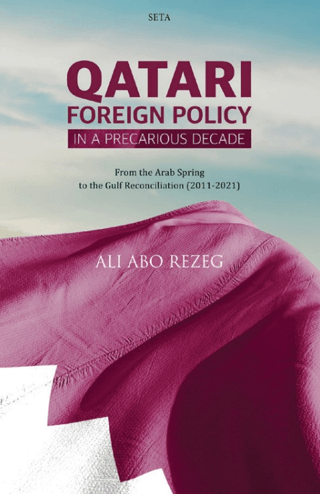Qatari Foreign Policy in a Precarious Decade

This book is a bid to analyze the Qatari proactive foreign policy in the precarious decade of 2011-2021, which commenced with the protests that hit several Arab capitals and ended with the Gulf reconciliation that put an end to the three and a half years of the Gulf row. Unlike the Arab monarchies, Qatar adopted a supportive position toward the Arab revolutions since the moment they broke out in late 2010. In fact, Qatar’s Al-Jazeera network had been an essential media mobilizer for the Arab masses and a major promoter of the revolutionary change process in the region. Furthermore, Qatar made efforts to encourage Arab and international support for humanitarian intervention in Libya and Syria, and generously backed revolutionary forces there both financially and militarily. However, Qatar’s pro-Arab Spring policies weakened its relations with its conservative neighbors, namely Saudi Arabia, the United Arab Emirates (UAE) and Bahrain, which, consequently, prompted them to boycott Doha and withdraw their ambassadors in 2014. Following this, in the summer of 2017, the same three states, along with Egypt, announced a total boycott and embargo on Doha before that rift was finally resolved in early 2021. Given the fact that Qatar’s political system is of the conservative-monarchic type, this book aims to review the dynamics that drove Doha to embrace a pro-change policy in the region during the Arab Spring by asking whether regime “types” matter in terms of their respective reactions to revolutions that occur within their geopolitical reach. It also discusses the reasons behind the Gulf crisis with the geopolitical and international transformations that led to the rift between the GCC countries and those that brought the crisis to the desired end.
This book is a bid to analyze the Qatari proactive foreign policy in the precarious decade of 2011-2021, which commenced with the protests that hit several Arab capitals and ended with the Gulf reconciliation that put an end to the three and a half years of the Gulf row. Unlike the Arab monarchies, Qatar adopted a supportive position toward the Arab revolutions since the moment they broke out in late 2010. In fact, Qatar’s Al-Jazeera network had been an essential media mobilizer for the Arab masses and a major promoter of the revolutionary change process in the region. Furthermore, Qatar made efforts to encourage Arab and international support for humanitarian intervention in Libya and Syria, and generously backed revolutionary forces there both financially and militarily. However, Qatar’s pro-Arab Spring policies weakened its relations with its conservative neighbors, namely Saudi Arabia, the United Arab Emirates (UAE) and Bahrain, which, consequently, prompted them to boycott Doha and withdraw their ambassadors in 2014. Following this, in the summer of 2017, the same three states, along with Egypt, announced a total boycott and embargo on Doha before that rift was finally resolved in early 2021. Given the fact that Qatar’s political system is of the conservative-monarchic type, this book aims to review the dynamics that drove Doha to embrace a pro-change policy in the region during the Arab Spring by asking whether regime “types” matter in terms of their respective reactions to revolutions that occur within their geopolitical reach. It also discusses the reasons behind the Gulf crisis with the geopolitical and international transformations that led to the rift between the GCC countries and those that brought the crisis to the desired end.
| Taksit Sayısı | Taksit tutarı | Genel Toplam |
|---|---|---|
| 1 | - | - |
| 2 | 83,46 | 166,92 |
| 3 | 56,68 | 170,04 |
| 6 | 29,64 | 177,84 |
| 9 | 20,45 | 184,08 |
| Taksit Sayısı | Taksit tutarı | Genel Toplam |
|---|---|---|
| 1 | - | - |
| 2 | 83,46 | 166,92 |
| 3 | 57,56 | 172,69 |
| 6 | 29,64 | 177,84 |
| 9 | 20,45 | 184,08 |
| Taksit Sayısı | Taksit tutarı | Genel Toplam |
|---|---|---|
| 1 | - | - |
| 2 | 83,46 | 166,92 |
| 3 | 57,72 | 173,16 |
| 6 | 29,64 | 177,84 |
| 9 | 20,63 | 185,64 |
| Taksit Sayısı | Taksit tutarı | Genel Toplam |
|---|---|---|
| 1 | - | - |
| 2 | 83,46 | 166,92 |
| 3 | 57,72 | 173,16 |
| 6 | 30,94 | 185,64 |
| 9 | 20,63 | 185,64 |
| Taksit Sayısı | Taksit tutarı | Genel Toplam |
|---|---|---|
| 1 | - | - |
| 2 | 83,46 | 166,92 |
| 3 | 52,52 | 157,56 |
| 6 | 29,64 | 177,84 |
| 9 | 20,63 | 185,64 |
| Taksit Sayısı | Taksit tutarı | Genel Toplam |
|---|---|---|
| Tek Çekim | 156,00 | 156,00 |
| 2 | 83,46 | 166,92 |
| 3 | 57,20 | 171,60 |
| 6 | 29,64 | 177,84 |
| 9 | 20,63 | 185,64 |



